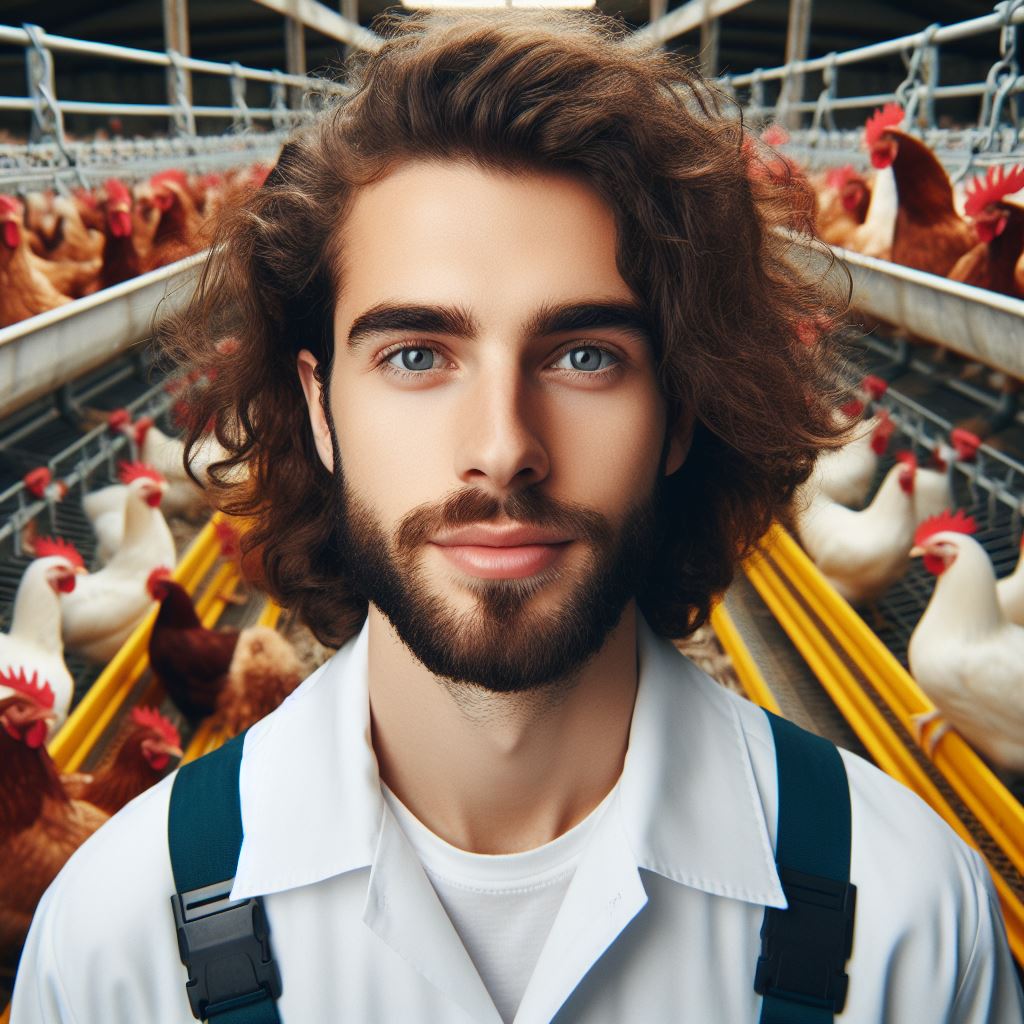Introduction
Definition of biosecurity
Biosecurity refers to the practices implemented on poultry farms to prevent the introduction and spread of diseases.
Importance of biosecurity in poultry farms
Biosecurity is crucial to protect the health and welfare of poultry, prevent disease outbreaks, and ensure food safety.
Poultry farms are vulnerable to disease outbreaks, which can result in significant economic losses.
Implementing effective biosecurity measures is vital to prevent the introduction and spread of diseases.
One of the main reasons why biosecurity is important is to protect the health and welfare of poultry.
Diseases can cause severe illness, high mortality rates, and reduced productivity in poultry flocks.
By implementing biosecurity protocols, farmers can minimize the risk of disease transmission and ensure the overall well-being of their birds.
In addition to protecting the health of poultry, biosecurity also plays a crucial role in safeguarding public health.
Certain poultry diseases, such as avian influenza, can be transmitted to humans, posing a significant threat to public health.
Proper biosecurity measures, such as strict hygiene practices and controlled access to poultry farms, help prevent the spread of these diseases and protect consumers from potential health risks.
Furthermore, biosecurity is vital for maintaining food safety.
Diseases can contaminate poultry products, making them unsafe for consumption.
By implementing biosecurity protocols, such as regular monitoring and testing, farmers can ensure that their products meet the necessary safety standards, protecting both the consumers and the reputation of their farm.
Essentially, biosecurity is of utmost importance in poultry farms.
It protects the health and welfare of poultry, prevents the spread of diseases, ensures public health safety, and maintains the quality and safety of poultry products.
Transform Your Agribusiness
Unlock your farm's potential with expert advice tailored to your needs. Get actionable steps that drive real results.
Get StartedImplementing and maintaining effective biosecurity measures should be a priority for all poultry farmers.
Disease prevention
Understanding diseases in poultry farms
Understanding diseases in poultry farms is essential for effective disease prevention.
Poultry farms are susceptible to various diseases, including avian influenza, Newcastle disease, and infectious bronchitis.
These diseases can significantly impact the productivity and overall health of the poultry.
Avian influenza, commonly known as bird flu, is a highly contagious viral infection that affects domestic poultry, including chickens and turkeys.
It can cause severe respiratory and gastrointestinal symptoms, leading to high mortality rates and economic losses for poultry farmers.
Newcastle disease is another viral disease that affects poultry and other birds.
It causes respiratory distress, nervous system disorders, and high mortality rates.
Infected birds may also show reduced egg production, which can significantly impact a farm’s revenue.
Infectious bronchitis is a highly contagious respiratory disease caused by the infectious bronchitis virus.
It affects chickens of all ages and can lead to reduced egg production, decreased growth rates, and increased susceptibility to other infections.
These common diseases pose a significant threat to poultry farms, necessitating effective disease prevention measures.
The impact of diseases on poultry production cannot be underestimated.
Outbreaks can lead to high mortality rates, reduced productivity, and financial losses.
Role of biosecurity in disease prevention
To prevent the spread of diseases within poultry farms, biosecurity measures play a vital role.
Biosecurity refers to a set of practices implemented to minimize the risk of disease introduction and control the spread of diseases.
It involves strict protocols and procedures to safeguard the health and well-being of the poultry.
Controlling the spread of diseases is crucial to maintaining a healthy flock.
Biosecurity practices include isolating sick birds, implementing strict hygiene protocols, and avoiding contact with other birds from different sources.
These measures help prevent the transmission of diseases and limit their impact on the entire flock.
Minimizing the risk of disease introduction is equally important in disease prevention.
Farms should implement strict biosecurity protocols for visitors, vehicles, and equipment entering the premises.
Biosecurity measures may include disinfecting footwear, limiting access to the farm, and enforcing quarantine for new birds.
Generally, understanding the common diseases in poultry farms and their potential impact on production is essential in disease prevention.
Showcase Your Farming Business
Publish your professional farming services profile on our blog for a one-time fee of $200 and reach a dedicated audience of farmers and agribusiness owners.
Publish Your ProfileBiosecurity plays a crucial role in controlling the spread of diseases and minimizing the risk of disease introduction.
By implementing strict biosecurity measures, poultry farmers can protect their flocks, maintain productivity, and ensure the sustainable success of their farms.
Read: Starting a Poultry Farm: Essential Steps & Tips
Components of biosecurity
Biosecurity is of utmost importance in poultry farms to prevent the entry and spread of diseases that can have detrimental effects on the birds and the entire industry.
It involves the implementation of various components to ensure strict control and management of potential risks.
Let’s explore the key components of biosecurity:
Physical barriers
Physical barriers play a crucial role in preventing the entry of unauthorized individuals and animals into the poultry farm premises.
Fencing the entire farm and establishing secure enclosures help create effective boundaries and limits access to only authorized personnel.
Controlled access points further enhance security measures by having designated entry and exit points.
This ensures that only authorized individuals, such as farm staff and essential visitors, can enter the premises, reducing the risk of introducing diseases through inadvertent sources.
Sanitation measures
Implementing proper sanitation measures is vital to maintain a clean and disease-free environment within the poultry farm.
Cleaning and disinfection protocols should be established and strictly followed to eliminate any potential pathogens that might exist on surfaces, equipment, and facilities.
Additionally, proper waste management practices should be in place to prevent the accumulation of organic materials, which can attract pests and serve as breeding grounds for disease-causing agents.
Regular waste removal and disposal should be carried out while ensuring compliance with environmental regulations.
Animal movement control
Strict control over the movement of animals within and outside the poultry farm is necessary to minimize the risk of disease transmission.
Restricting visitors and vehicles helps limit the exposure of birds to external sources of infection.
Quarantine procedures should be implemented to isolate new or sick birds from the rest of the flock.
This prevents the rapid spread of any potential diseases and allows for proper monitoring and treatment, if required.
Quarantine areas should be equipped with appropriate facilities and managed by trained personnel.
Biosecurity education and training
Ensuring that all staff and workers receive proper education and training on biosecurity practices is essential for effective implementation.
They should be knowledgeable about the importance of biosecurity, potential risks, and the correct procedures to follow.
Raising awareness among farm workers about the significance of biosecurity measures helps foster a sense of responsibility and accountability.
Regular training sessions, workshops, and information dissemination through various mediums can significantly contribute to maintaining a high level of biosecurity.
In summary, the components of biosecurity are vital for safeguarding poultry farms from potential disease outbreaks.
The implementation of physical barriers, sanitation measures, animal movement control, and biosecurity education and training collectively contribute to maintaining a healthy and disease-free environment.
By diligently following these components, poultry farmers can ensure the well-being of their flocks and the sustainability of the poultry industry as a whole.
Read: Poultry Health: Preventing Common Diseases
Benefits of implementing biosecurity
Implementing biosecurity measures on poultry farms provides various benefits.
These can be categorized into three major areas: preventing economic losses, safeguarding animal health and welfare, and protecting public health.
Preventing economic losses
One of the key advantages of implementing biosecurity measures on poultry farms is the prevention of economic losses.
The following benefits contribute to this:
Increased productivity and profitability
Implementing biosecurity practices such as proper hygiene and disease control helps enhance the overall productivity and profitability of poultry farms.
By preventing disease transmission, the efficiency of poultry production can be maximized, leading to higher financial returns.
Reducing treatment and vaccination costs
Biosecurity measures significantly reduce the need for treatments and vaccinations, resulting in lower costs for poultry farmers.
By preventing disease outbreaks, the expenses associated with disease management are minimized.
Safeguarding animal health and welfare
Implementing biosecurity measures also plays a crucial role in safeguarding the health and welfare of poultry.
The following benefits are associated with this aspect:
Minimizing stress levels among poultry
Biosecurity measures create a healthy and disease-free environment for poultry, minimizing stress levels.
This results in improved overall well-being, better growth rates, and higher quality products.
Limiting disease outbreaks and mortality rates
By implementing biosecurity protocols, the risk of disease outbreaks and subsequent mortality rates can be effectively reduced.
Showcase Your Farming Business
Publish your professional farming services profile on our blog for a one-time fee of $200 and reach a dedicated audience of farmers and agribusiness owners.
Publish Your ProfileThis ensures a healthier flock, resulting in reduced losses for farmers.
Protecting public health
A well-implemented biosecurity program on poultry farms not only benefits the farmers but also protects public health. The following advantages are associated with this aspect:
Reducing the risk of zoonotic diseases
Zoonotic diseases, which can be transmitted from animals to humans, pose a significant public health risk.
By implementing biosecurity measures, the likelihood of zoonotic disease transmission is minimized, thus safeguarding public health.
Maintaining consumer trust and confidence
Biosecurity measures contribute to maintaining consumer trust and confidence in poultry products.
Consumers are more likely to purchase and consume poultry products when they are assured of stringent disease prevention practices and safe food production processes.
Overall, implementing biosecurity measures on poultry farms brings numerous benefits.
It prevents economic losses by increasing productivity, reducing treatment and vaccination costs.
It safeguards animal health and welfare by minimizing stress levels and limiting disease outbreaks.
Moreover, it protects public health by reducing the risk of zoonotic diseases and maintaining consumer trust and confidence.
By prioritizing biosecurity, poultry farms can thrive economically, provide healthier poultry, and ensure safe food production for consumers.
Read: Innovative Poultry Housing Solutions in 2024

Best Biosecurity Practices for Poultry Farms
Regular Inspection and Maintenance of Facilities
- Regularly inspect and maintain all facilities to ensure they are in optimal condition for biosecurity purposes.
- Perform routine checks on fences, gates, and walls to prevent breaches and potential contamination.
- Clean and disinfect all equipment, tools, and vehicles to eliminate any potential carriers of diseases.
- Regularly assess and repair any structural damage to prevent the entry of pests or wild birds.
Strict Visitor Protocols
- Implement strict protocols for visitors to minimize the risk of introducing diseases to the poultry farms.
- Establish designated entry points and request all visitors to follow proper hygiene practices.
- Provide protective clothing and footwear to guests and enforce their use when entering the premises.
- Arrange specific visiting hours and limit visitor access to only necessary areas of the farm.
Proper Veterinary Supervision and Disease Surveillance
- Ensure regular veterinary supervision to monitor and assess the flock’s health status.
- Conduct routine health checks, such as blood tests and fecal examinations, to detect any potential diseases.
- Implement effective disease surveillance systems to identify and respond promptly to any signs of infection.
- Collaborate with veterinarians to develop vaccination programs and implement necessary biosecurity measures.
Biosecurity Plan Development and Implementation
- Develop a comprehensive biosecurity plan tailored to the specific needs of the poultry farm.
- Identify potential risks and establish appropriate strategies to minimize biosecurity threats.
- Train all staff members on biosecurity protocols and regularly conduct drills to ensure preparedness.
- Implement strict biosecurity measures, such as controlled access and separation of different poultry groups.
Collaboration with Neighboring Farms and Authorities
- Collaborate with neighboring farms to establish a unified approach to biosecurity practices.
- Share knowledge, experiences, and best practices to collectively improve biosecurity measures.
- Coordinate with local authorities and veterinary services to stay updated on any disease outbreaks or regional biosecurity requirements.
- Participate in community outreach programs to raise awareness about the importance of biosecurity in poultry farming.
By implementing these best biosecurity practices, poultry farms can minimize the risk of disease outbreaks, protect the health and welfare of their flock, and ultimately safeguard the profitability of their operations.
Remember, prevention is always better than cure when it comes to biosecurity in poultry farms.
Read: Organic Livestock: Pros & Cons
Conclusion
The importance of biosecurity in poultry farms
Biosecurity plays a crucial role in safeguarding poultry farms from disease outbreaks and ensuring the overall health and productivity of the industry.
Encouragement for readers to prioritize biosecurity measures
It is essential for readers to understand the significance of implementing biosecurity measures and make them a top priority in their operations.
Protect your poultry and preserve your livelihood by prioritizing biosecurity measures.
Vigilant practices, from strict farm hygiene to controlled access, shield against diseases.
Safeguard your flock’s health and ensure sustainable success.
Embrace biosecurity- your first line of defense for thriving, disease-free poultry farming.
Your commitment secures a resilient and prosperous future for your poultry venture.
The positive impact of biosecurity on the poultry industry.
By prioritizing biosecurity, poultry farms can effectively reduce the risk of disease transmission, protect the welfare of their birds, and contribute to the sustainability and success of the poultry industry as a whole.




